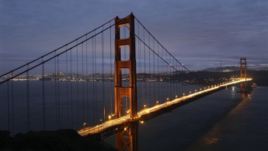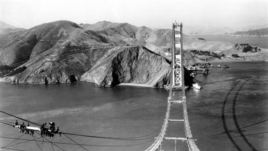This is the VOA Special English Technology Report.
The Golden Gate Bridge is celebrating its 75th anniversary. The bridge opened to vehicle traffic on May 28th, 1937. Since then, more than two billion vehicles have crossed the world famous structure between San Francisco and Marin County, California. As many as 112,000 cars make the trip each day.
The Golden Gate Bridge had the longest suspension span in the world, at the time it was built. The suspended roadway stretches 1,280 meters between the bridge's two tall towers. Today it still rates among the top ten longest bridge spans in existence.

Mary Currie works for the Golden Gate Bridge, Highway and Transportation District. She says the bridge is one of the most extraordinary engineering projects of all time.
MARY CURRIE: "The Golden Gate Bridge is an engineering marvel certainly, and it gets award after award after award for what it means in civil engineering and structural engineering. It's also a place where things happen first. For example, we were the first suspension bridge to have to change the roadway deck."
The Golden Gate Bridge is named after the Golden Gate Strait. That narrow passage of water connects the San Francisco Bay to the Pacific Ocean. Joseph Strauss was the chief engineer of the Golden Gate Bridge project. Work began in 1933. The project took four years to complete.

The bridge is 2,788 meters long from one end to the other. It is 27 meters wide. Two large cables pass over the top of the bridge's towers. These structures stand 227 meters above water and 152 meters above the road. Each cable holds more than 27,500 strands of wire.
Two hundred fifty pairs of vertical suspender ropes connect the support cables to the suspension bridge. This is part of what enables the bridge to move up and down by nearly five meters.
The Golden Gate Bridge weighed 811,500,000 kilograms when it was completed in 1937. The San Francisco Chronicle newspaper called the finished project, "a 35 million dollar steel harp!"
Architect Irving Morrow gets credit for the bridge's bright orange color. The Navy wanted the bridge painted in yellow and black. The Air Force had suggested red and white.
MARY CURRIE: "But we were fortunate that Irving Morrow knew that that color would blend with the environment, it would contrast with the ocean and the air above, and it would also allow the art deco styling to really stand out."
And that's the VOA Special English Technology Report, written by June Simms. Transcripts, MP3s and podcasts of our reports are at voaspecialenglish.com. We're also on Facebook and Twitter at VOA Learning English. I'm Steve Ember.
art deco: 裝飾藝術
Two art exhibits in Washington
Visiting 7 man-made wonders in the US
The Seven Wonders of the World
(來源:VOA 編輯:旭燕)
